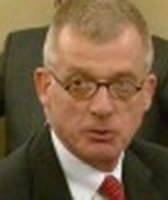Get PolitiFact in your inbox.
Republican Josh Hawley embraced the policies of President Donald Trump and criticized Democrat incumbent Claire McCaskill for a brand of "party-line liberalism" that is out-of-step with Missouri voters during Thursday’s televised Senate debate.
"It’s just the party line over and over and over," Hawley said during an hour-long debate, moderated by PBS’s Judy Woodruff.
McCaskill claimed the exact opposite, painting herself as someone who has worked with Republicans to get things done in two terms in Washington.
"Campaigns are a time that we highlight differences, but I think they should also be a time that voters take a hard look at which candidate can do more than criticize their opponent, who can actually find common ground," McCaskill said. "I’m very proud of what I’ve gotten done in the Senate."
The race in Missouri has clear national implications. Republicans in the Senate control a slim 51-49 majority, but Democrats need to hold onto 10 seats in states President Donald Trump won in 2016, in addition to flipping two others. Trump won Missouri two years ago by nearly 20 percentage points.
PolitiFact Missouri fact-checked claims from both candidates that were either misleading, or needed additional context.
McCaskill: "These tariffs have killed commodity prices. There's not a bean farmer in Missouri that's going to come out even this year."
McCaskill isn’t far off in characterizing the situation as grim for Missouri farmers. Attributing that entirely to Trump’s tariffs, though, is an exaggeration.
For context, it’s true that the price of soybeans — which undoubtedly has an effect on whether Missouri soybean farmers turn a profit — has been dropping: a University of Missouri Food and Agriculture Policy Research Institute report from August projected the market year average price at $8.73 per soybean bushel, the lowest since 2006.
While tariff-induced smaller prices have had an impact on profits, so have smaller yields.
For example, this year’s Missouri soybean harvest is 7 percent smaller than 2017’s, according to the Food and Agriculture Policy Research Institute.
Help also exists for farmers who are struggling. The USDA has instituted an aid program known as the Market Facilitation Program to provide relief to farmers proportional to their yield size. McCaskill called this program insufficient.
— Andrew Withers
Hawley: "Sen. McCaskill takes more money than anybody in Congress from the insurance industry except for one other liberal."
This is a largely accurate claim that Hawley has made before, one based on a ranking by OpenSecrets.org. An update of the report places McCaskill third overall.
It’s important to know the numbers are based on all insurance companies, not just health care.
— Hannah Archambault
McCaskill: "Wages are stagnant. In fact, wages are 1.8 percent lower in this country than they were a year ago."
McCaskill’s statistic doesn’t come from a government source, rather from data from the PayScale Index, a calculation made by a private group. It’s also out of date.
The PayScale index showed a drop in wages of 1.8 percent between the first and second quarters of 2018. The PayScale index showed a smaller dip between the second and third quarters of 2018.
But that data is at odds with official government data collected by the Bureau of Labor Statistics. The BLS released new data Oct. 16 showing that median weekly earnings have increased in each of the first three quarters of 2018. In inflation-adjusted dollars, median weekly earnings have increased from $350 weekly to $355 weekly so far in 2018. That’s an increase of 1.4 percent, not a decrease of 1.8 percent as McCaskill said.
Other BLS measurements of wages follow a similar upward trend.
Gary Burtless, a Brookings Institution economist, told us for a similar fact-check in July: "I don’t think there’s any evidence I would trust that inflation-adjusted wages have declined noticeably, either over the entire Trump administration or in the period since Congress passed the new tax law," Burtless said.
— Hannah Archambault
Hawley: McCaskill "voted no on the tax cut. She wants to reverse it and raise your taxes, raise middle-class taxes."
Hawley’s claim is misleading. McCaskill did vote against the 2017 tax cut bill championed by Trump and Republicans. But McCaskill said she opposed the proposal because she believe it disproportionately benefited wealthier Americans.
"I wanted to support real tax reform. This isn’t it — this is a bad deal for Missouri families," McCaskill said in a statement after her vote. "Working people in Missouri deserve better than to get scraps, while corporations and wealthy business owners make out like bandits."
McCaskill also has not called for fully repealing, or reversing the tax cut bill. She said she would "never vote to repeal the parts that help middle-class families."
— Matthew Hall
McCaskill: In Hawley’s first campaign, Hawley "said that his campaign was funded almost entirely by the biggest right to work advocate in the state. 75 percent. Over $4 million."
The advocate she referenced is David Humphreys, CEO and president of the Joplin-based business Tamko Building Products, Inc. He has been an avid supporter and donor of Republican candidates advocating for the "right to work" movement, which advocates against employees being required to join a union.
Humphreys, his family and associates of Tamko Building Products, Inc. donated over $4.5 million for Josh Hawley’s successful attorney general campaign in 2016, which made up approximately 75 percent of individual contributions, according to KOMU .
Hawley’s run for Senate has drawn over $2 million from Humphreys as well to various Hawley-supporting Super PACS including Missouri Rising Action and CFG Action Missouri. The Hawley-supporting Super PACs include Missouri Rising Action and CFG Action Missouri, according to the Federal Election Commission.
— Matthew Hall
Hawley: McCaskill "voted to cut $716 billion from Medicare in order to pay for Obamacare."
The claim is too sweeping by implying cuts to current benefits. For years, PolitiFact has been skeptical of numerous previous claims that Obamacare cuts Medicare.
Medicare spending continues to rise, but it will climb at a slower pace than without the law. The law reduced future spending for Medicare by targeting reductions in payments to health care providers. The spending reductions come in the form of reduced payments to providers of health care, such as hospitals and insurance companies.
— Dylan Sherman
McCaskill: "I just voted for — along with President Trump, agreeing with President Trump — that we needed a big increase to our military budget."
McCaskill is likely referencing her vote on the National Defense Authorization Act for Fiscal Year 2019. The bill passed the Senate in August 87-10, with only seven Democrats opposing the bill. The budget provides $717 billion to fund the military, an increase of nearly 10 percent. The budget also includes a 2.6 percent wage increase to military personnel.
Trump called the budget increase "one of the largest increases in national defense spending in American history." It’s not.
— Dylan Sherman
McCaskill: "I have certainly voted and worked on a bill that would have given $25 billion towards border security."
McCaskill did support a proposal called the so-called "Common Sense Plan," or the Broader Options for America Act, that would have put $25 billion toward "the construction of physical barriers, border security technologies, and tactical infrastructure."
But it’s important to note that plan would also have implemented a path to citizenship for "dreamers" who were brought illegally to the United States as minors. It failed in the Senate and was opposed by a majority of Republicans.
McCaskill voted against a bill sponsored by Sen. Chuck Grassley, R-Iowa, that among other things, would have funded a border wall. As PolitiFact has reported reported, the legislation included other elements of Trump’s immigration agenda, including tighter curbs on legal immigration, that made it unpalatable to most Democrats." It failed in the Senate because it could not garner the 60 votes needed to pass.
– Kathryn Palmer
McCaskill: "According to an independent group, I am the fifth-most likely senator to break with my party."
McCaskill is right up there. Campaign spokesman Eric Mee cited a February 2018 analysis released by the nonpartisan Congressional Quarterly magazine. It stated that in 2017, McCaskill was among the top five most independent senators, voting against her party majority 18 percent of the time.
According to a wider time period in a ProPublica database, McCaskill is the 10th-most likely U.S. senator of the 115th Congress (Jan 3, 2017 - present) to vote against party line, voting against the Democratic majority 16.9 percent of the time.
— Kathryn Palmer
Hawley: McCaskill voted with "with Chuck Schumer 90 percent of the time."
McCaskill: "And President Trump 50 percent of the time."
Their numbers aren’t far off.
According to ProPublica’s "Head to Head" tool that compares lawmakers’ voting records, McCaskill agreed with Democrats and Schumer, the Senate minority leader, on 80 percent of votes in 2017-18. Out of 548 votes, they have disagreed on 107, according to ProPublica. She broke with Schumer on six major votes, including on the nomination of Mike Pompeo to be secretary of state and on the passage of a joint resolution disapproving a rule known as the Stream Protection Rule.
In 2015-16, the two agreed on 84 percent of votes, and the year before that agreed on 94 percent of votes, according to ProPublica.
McCaskill voted with Trump on 58 percent of certain votes in 2017, according to Congressional Quarterly’s annual voting study. By comparison, she voted with Democratic President Barack Obama between 92 and 100 percent of the time during his eight years in office.
— Tessa Weinberg
Our Sources
See links within fact-checks.







































